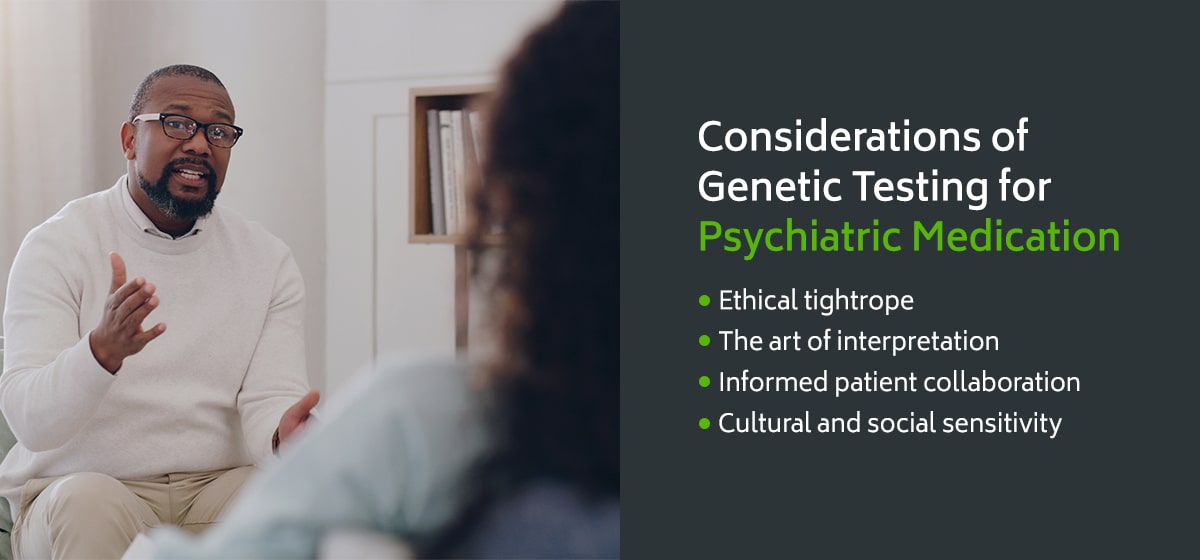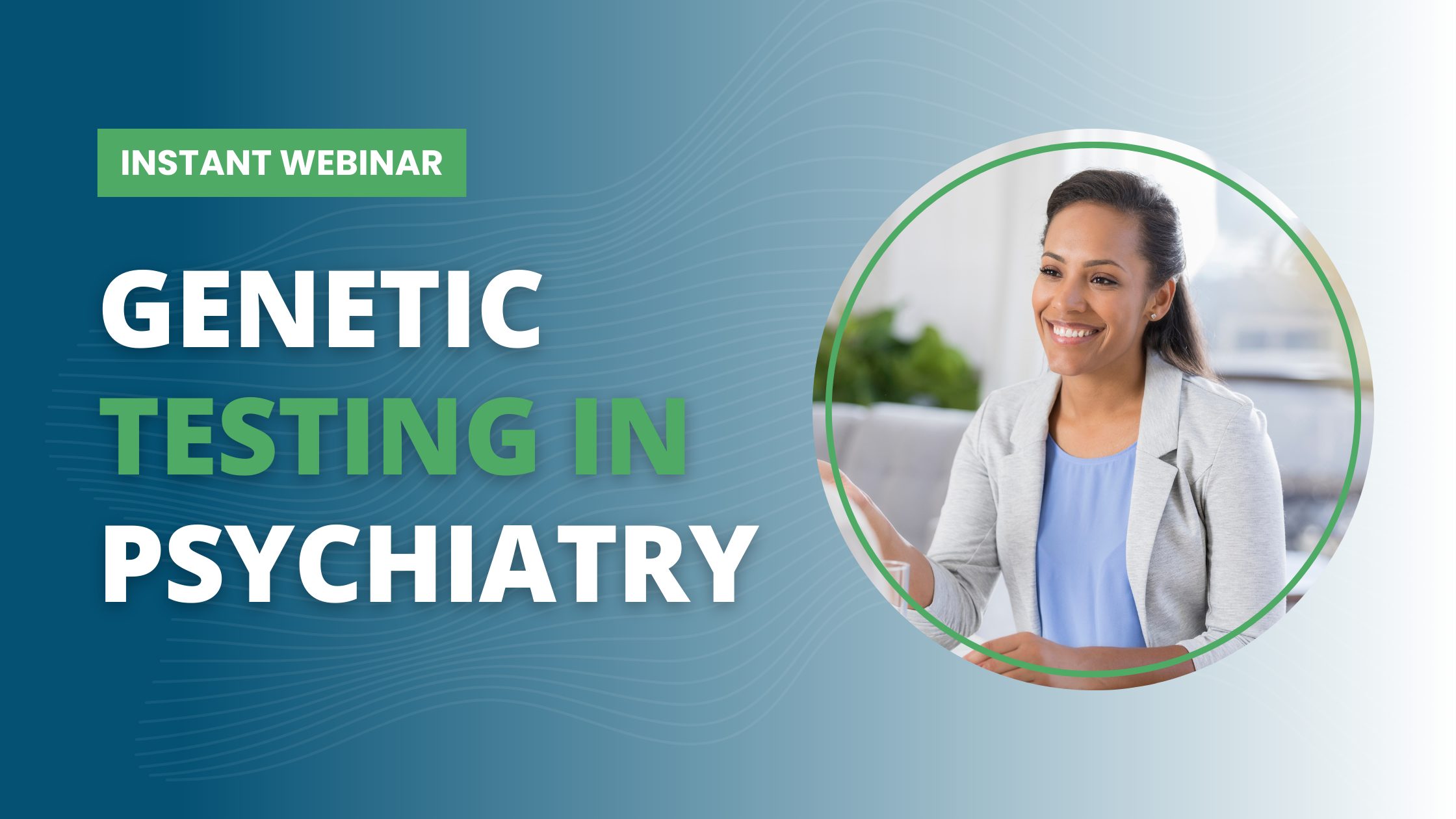
Using Genetic Testing to Enhance Psychiatric Medication Selection
Finding the optimal medication regimen for each patient often involves trial and error. However, recent strides in genetics have bestowed psychiatry with a potent tool — genetic testing — to streamline this process. Let's dive into the application of genetic testing in psychiatric medication choice and its profound potential to transform treatment strategies.
Decoding Genetic Testing for Psychiatric Medication Choice
The integration of psychiatry genetic testing could herald a new era of precision medicine in psychiatry.
The foundation of genetic testing for psychiatric medication rests on identifying specific genetic markers, known as alleles, that are key to treatment success. These markers, often linked to drug metabolism enzymes, neurotransmitter receptors and cellular signaling pathways, provide a glimpse into the patient's unique pharmacogenetic profile.
Clinicians must decode the complex interplay between genetic markers and treatment outcomes, making sense of the probabilities and tendencies that genetic information provides. With this knowledge, mental health professionals can tailor their treatment strategies, adjusting medication dosages and selecting drugs that align with a patient's genetic predispositions.
What Is Genetic Testing for Psychiatric Medications Choice?
By exploring the patient's genetic blueprint, mental health professionals can tailor treatment plans with unparalleled precision, leading to more effective interventions and improved patient outcomes.
Understanding the Process
Genetic testing comprehensively examines specific genes linked to drug metabolism, neurotransmitter pathways and receptor interactions. By scrutinizing these genetic markers, mental health professionals can decipher how an individual's body processes medications, influences neurotransmitter activity and modulates responses to treatment. This knowledge empowers clinicians to make informed decisions about medication selection, dosage optimization and potential side effect management.
Guiding Treatment Decisions
The value of genetic testing becomes particularly evident in its ability to guide treatment decisions in cases that have historically posed challenges. Individuals who exhibit treatment resistance or severe side effects can benefit immensely from these insights. Clinicians can identify genetic markers that may contribute to poor medication response or adverse reactions, enabling them to explore alternative treatment options more efficiently. For patients with complex comorbidities, genetic testing can elucidate potential interactions between different medications, enhancing treatment planning and minimizing risks.
Minimizing Trial and Error
A significant advantage of genetic testing is its potential to expedite the trial-and-error process commonly associated with psychiatric medication selection. Clinicians can bypass the uncertainty often accompanying finding the right medication fit. Instead of subjecting patients to a series of trial medications, each accompanied by its side effects and potential failures, genetic testing helps mental health professionals identify medications more likely to be effective.

Considerations of Genetic Testing for Psychiatric Medication
Mental health professionals are responsible for steering the ethical course. Let's take a look at what clinicians need to consider moving forward:
- Ethical tightrope: As the potential of genetic testing in psychiatric medication choice unfolds, it walks a tightrope of ethical considerations. While genetic insights can revolutionize treatment, psychiatrists are also responsible for safeguarding patient privacy and data security. Mental health professionals must tread carefully, recognizing that the genetic information obtained is inherently personal.
- The art of interpretation: Genetic testing is not a crystal ball — it's an intricate mosaic of probabilities that requires skilled interpretation. Merging the realms of genetics and clinical practice demands a delicate synergy of genetic expertise and clinical acumen. Mental health professionals must decipher the complex interplay between genetic markers and treatment outcomes, acknowledging that genetic insights are just one facet of a multidimensional assessment. While genetic testing can illuminate potential avenues for treatment, it must harmonize with comprehensive clinical evaluations.
- Informed patient collaboration: Empowering patients with a clear understanding of the benefits, limitations and implications of genetic testing is integral. Engaging in shared decision-making becomes a cornerstone of ethical practice. Mental health professionals should foster open dialogues with patients, ensuring they comprehend the nuances of genetic insights and the potential impact on treatment choices.
- Cultural and social sensitivity: Ethical considerations extend beyond individual privacy. Mental health professionals must also acknowledge the cultural and social contexts influencing genetic testing's acceptance and interpretation. Culturally sensitive approaches to genetic testing respect diverse perspectives and ensure that patients' beliefs and values are considered.
What Kinds of Information Do These Tests Show?
Mental health professionals are equipped with a formidable tool for honing treatment decisions. Here are a few examples of information uncovered by genetic testing:
Cracking the Code
Genetic testing unfolds a treasury of insights, revealing the intricacies of an individual's medication response. Within this trove lie precious gems — metabolism rates, potential side effects and nuanced medication responsiveness. For clinicians, these genetic revelations offer a pathway to deciphering the patient's genetic code, an intricate puzzle that holds the key to optimized treatment outcomes.
Aiding Rapid Relief
Genetic testing assumes a role of paramount significance in instances where time is of the essence. Take the landscape of depression treatment, for example. Here, genetic markers offer vital signposts, guiding clinicians toward the optimal choice between SSRIs and SNRIs. This genetic insight expedites relief, enabling mental health professionals to prescribe more precisely and hasten the patient's path toward improved well-being.
Tailoring Dual Diagnosis Strategies
Genetic testing emerges as a beacon of hope for individuals navigating the intricate web of dual diagnoses. Genetic markers can unravel the intertwined complexities of co-occurring conditions, shedding light on potential treatment avenues that align with an individual's unique genetic makeup. This approach streamlines medication choices and enhances the synergy between treatments for different conditions.
Predicting Vulnerabilities and Adverse Reactions
Genetic testing extends its reach to foresee potential vulnerabilities and adverse reactions. By studying genetic markers, clinicians understand patients' predisposition to specific side effects or poor responses to certain medications. With this prescient insight, mental health professionals can proactively circumvent adverse reactions, steering clear treatments that might exacerbate the patient's condition.
Watch our Webinar:
Optimizing Medication Selection for Better Outcomes
Finding the optimal medication regimen for each patient often involves frustrating trial and error. But advancements in genetics have paved the way for a groundbreaking solution – genetic testing.
When Is Genetic Testing for Psychiatric Medications a Good Idea?
From treatment-resistant conditions to complex comorbidities, pediatric and geriatric care, let's look at the contextual nuances that help determine when genetic testing can be a transformative asset in guiding treatment choices:
The Road to Resilience
In the labyrinth of mental health care, genetic testing emerges as a beacon of hope for those navigating the arduous path of treatment-resistant conditions. When conventional treatments fail to yield relief and patients find themselves ensnared in a cycle of trial and error, genetic testing offers a potential escape route. For individuals grappling with the weight of multiple unsuccessful medication attempts, these tests illuminate potential pathways to resilience. Mental health professionals can identify alternative strategies that align with an individual's unique genetic makeup by uncovering genetic markers that underlie treatment responsiveness.
Conditions and Catalysts
While genetic testing holds promise across a spectrum of mental health conditions, there are instances where its value shines even brighter. Conditions marked by complexity, such as bipolar disorder with its interplay of mood states, demand personalized treatment strategies. Genetic insights can illuminate the genetic underpinnings of these conditions, guiding mental health professionals toward the most promising treatment avenues. Moreover, scenarios involving complex comorbidities — when two or more conditions coexist — present intricate treatment challenges.
Pediatric Psychiatry
The landscape of pediatric psychiatry is also enriched by genetic testing. Children and adolescents often present unique treatment challenges due to their developing physiology and distinct responses to medications. Genetic testing can offer insights into potential medication responses and side effects in this vulnerable population. It becomes particularly valuable when considering early interventions to prevent a lifetime of struggle.
Individualizing Geriatric Care
The senior population, marked by its own challenges and considerations, benefits from integrating genetic testing into treatment decisions. Aging bodies metabolize medications differently, and genetic testing can provide crucial insights into how older adults might respond to psychiatric drugs. This individualized approach minimizes the risk of adverse reactions and empowers mental health professionals to navigate the complexities of aging-related changes in drug metabolism.
Navigating Precision Behavioral Health with Genetic Insights Using ICANotes
As the horizon of behavioral health expands, genetic testing emerges as a beacon of precision. Genetic insights unlock personalized medication responses, aiding mental health professionals in tailoring treatments. Yet, ethical considerations, nuanced interpretation and comprehensive assessments are essential.
With ICANotes, we're committed to innovation in behavioral health. We empower professionals to chart informed treatment paths by integrating genetic insights into our platform. Please get in touch with us today for a comprehensive consultation.
Start Your Free Trial Today


